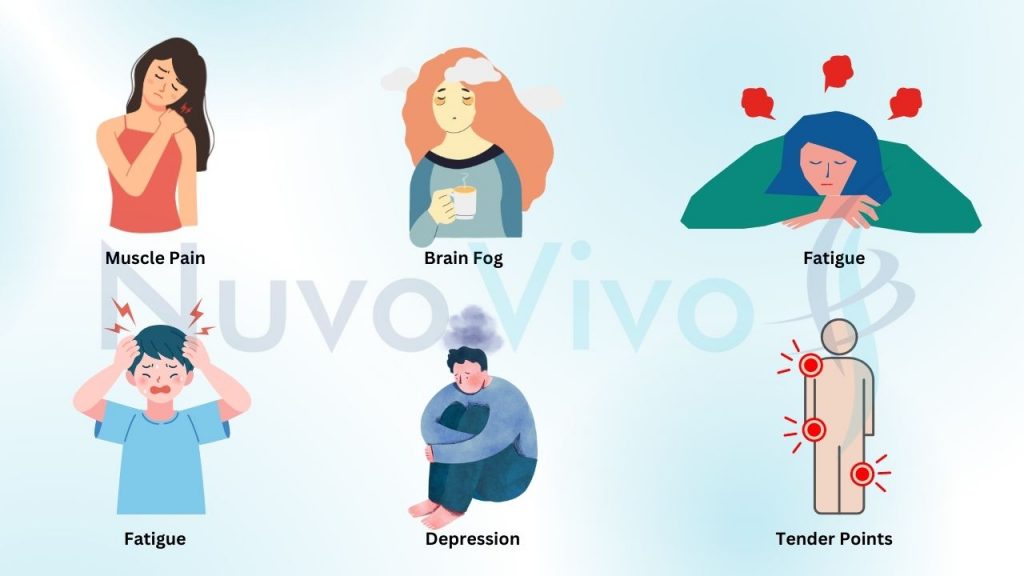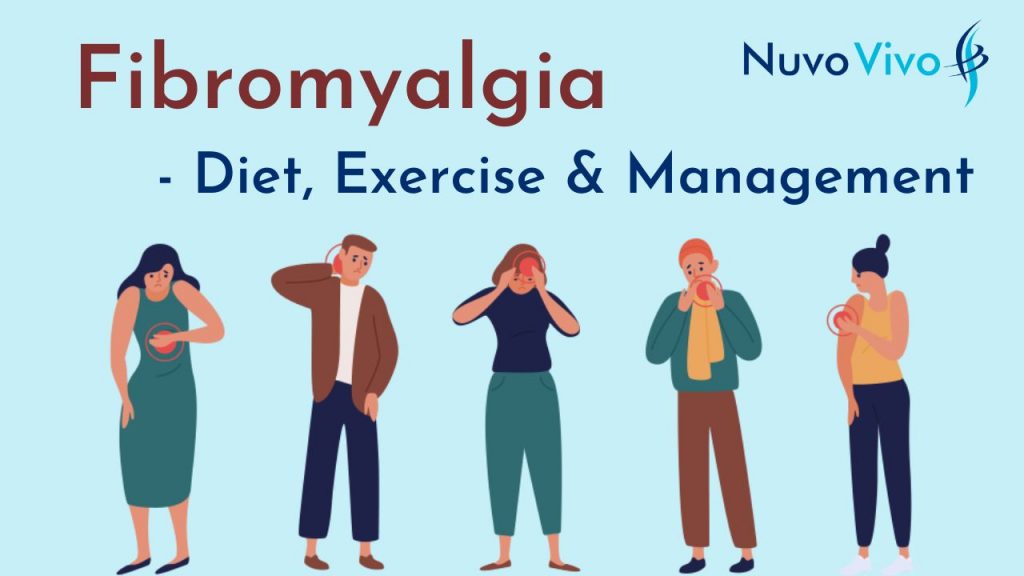Fibromyalgia is a chronic pain disease that affects millions worldwide. Women are more prone to and affected by fibromyalgia, than men. It is characterized by widespread musculoskeletal pain, tenderness, and fatigue, as well as other symptoms such as sleep disturbances, anxiety, and depression. These symptoms can greatly impact an individual’s quality of life and ability to carry out daily activities
Causes of Fibromyalgia
The exact cause of fibromyalgia is unknown, but several factors are thought to play a role, including:
- Genetics: Some research suggests that fibromyalgia may be passed down through families and may be related to certain genetic factors.
- Physical or emotional trauma: Traumatic events, such as physical injury or emotional stress, may trigger the development of fibromyalgia.
- Abnormal levels of certain brain chemicals: Fibromyalgia may be associated with alterations in the levels of certain brain chemicals, including serotonin and substance P, which play a role in pain perception.
- Abnormal pain processing: Individuals with fibromyalgia may have a heightened sensitivity to pain due to changes in the way their brain processes and perceives pain.
- Sleep disturbances: Poor quality or quantity of sleep may play a role in the development and maintenance of fibromyalgia.
While the exact cause of fibromyalgia remains unclear, research continues to investigate potential contributing factors and new treatments for this condition
Symptoms of Fibromyalgia
The symptoms of fibromyalgia can vary from person to person, but commonly include:
- Widespread pain: Pain is typically felt in multiple areas of the body, such as the neck, back, hips, and arms.
- Fatigue: Chronic fatigue is a common symptom of fibromyalgia, which can be severe and affect daily activities.
- Sleep disturbances: People with fibromyalgia often have trouble falling asleep or staying asleep, and may wake up feeling unrefreshed.
- Tender points: People with fibromyalgia may have tender points, which are specific areas of the body that are painful when pressure is applied.
- Cognitive difficulties: Fibromyalgia can cause cognitive difficulties, such as memory problems and trouble concentrating, also known as “fibro fog.”
- Headaches: Chronic headaches, including migraines, are common in individuals with fibromyalgia.
- Depression and anxiety: Depression and anxiety are common in individuals with fibromyalgia, and may be related to chronic pain and sleep disturbances.
It is important to note that the severity and type of symptoms can vary greatly from person to person, and that individuals may experience symptoms differently over time


Treatment of Fibromyalgia
The therapeutic management of fibromyalgia involves a combination of medical, physical, and psychological interventions to reduce pain and improve quality of life. Some common therapeutic approaches include:
- Medications: Nonsteroidal anti-inflammatory drugs (NSAIDs), pain relievers, antidepressants, and anticonvulsants are some medications that may be used to manage fibromyalgia symptoms.
- Physical therapy: Physical therapy can help improve strength, flexibility, and physical function through exercises, stretches, and other techniques.
- Cognitive behavioral therapy (CBT): CBT is a type of psychotherapy that can help individuals with fibromyalgia manage their pain and improve their mood and quality of life.
- Complementary and alternative therapies: Some individuals may find relief from complementary and alternative therapies, such as massage, acupuncture, or chiropractic, for managing fibromyalgia symptoms.
- Lifestyle changes: Making changes to one’s diet, exercise routine, and sleep habits can help improve overall health and manage symptoms of fibromyalgia.
It is important to work with a healthcare provider to determine the best therapeutic approach for individual needs and goals. The most effective treatment plan will vary based on the severity and symptoms of each person’s fibromyalgia, as well as their overall health and personal preferences.
Also Read: Autoimmune diseases – Diet, Exercise & Mgmnt
Lifestyle Management – Fibromyalgia
Lifestyle changes can play a crucial role in managing fibromyalgia and improving overall health and well-being. Some lifestyle management strategies for fibromyalgia include:
- Sleep: Getting regular, quality sleep is essential for reducing pain and improving overall health. Individuals with fibromyalgia may benefit from practising good sleep hygiene, such as sticking to a consistent sleep schedule and creating a relaxing sleep environment.
- Exercise: Regular exercise can help improve physical function, reduce pain, and improve mental well-being.
- Stress management: Reducing stress and practising relaxation techniques, such as deep breathing, meditation, or yoga, can help improve symptoms of fibromyalgia.
- Healthy diet: Eating a balanced, healthy diet and avoiding trigger foods can help reduce symptoms and improve overall health.
- Avoiding smoking and excessive alcohol consumption: Smoking and excessive alcohol consumption can worsen fibromyalgia symptoms and negatively impact overall health.
- Pacing activities: Avoiding overexertion and pacing activities throughout the day can help reduce pain and prevent fatigue.
- Support network: Building a support network of friends, family, and other individuals with fibromyalgia can provide emotional support and help individuals manage their condition.
It’s important to work with a healthcare provider to determine the best approach for managing fibromyalgia and finding relief from symptoms. Making gradual lifestyle changes and seeking support from friends, family, and healthcare providers can improve overall well-being and quality of life.
Diet for Fibromyalgia
There is no specific diet recommended for fibromyalgia, but some dietary changes may help alleviate symptoms. It is important for individuals with fibromyalgia to maintain a balanced and healthy diet. In addition, reducing or avoiding processed foods, sugar, caffeine, and alcohol may help improve symptoms. Some individuals may also benefit from avoiding certain foods that trigger their symptoms, such as gluten or dairy
Dietary guidelines for fibromyalgia may include:
- Maintaining a balanced and healthy diet: Consume a variety of fruits, vegetables, whole grains, and lean proteins to support overall health and well-being.
- Reducing processed foods: Limit consumption of processed foods and those high in sugar, salt, and unhealthy fats.
- Avoiding trigger foods: Some individuals may find relief by avoiding certain foods that trigger their symptoms, such as gluten or dairy.
- Hydrating: Drink plenty of water to stay hydrated and support proper bodily function.
- Moderating caffeine and alcohol intake: Consuming too much caffeine or alcohol may worsen symptoms, so moderation is recommended.
- Supplements: Some individuals may benefit from taking dietary supplements, such as magnesium or omega-3 fatty acids, to support their overall health.
- Consult a healthcare provider or registered dietitian: It is important to consult with a healthcare provider or registered dietitian to determine a personalized dietary plan that addresses individual needs and concerns.
It’s essential to note that not all dietary changes may work for every individual with fibromyalgia
Also Read: Arthritis – Diet & Exercise Management
Exercise for Fibromyalgia
Exercise can play a crucial role in managing symptoms of fibromyalgia and improving overall physical and mental well-being. The following are some types of exercise that may be beneficial for individuals with fibromyalgia:
- Aerobic exercise: Low-impact activities, such as walking, swimming, or cycling, can help improve cardiovascular health and reduce pain.
- Strength training: Resistance training can help build muscle strength and improve physical function.
- Stretching: Gentle stretching can improve flexibility and reduce muscle pain and stiffness.
- Yoga and tai chi: These practices can help improve flexibility, balance, and relaxation, as well as reduce stress.
- Water-based exercise: Water-based activities, such as water aerobics or aqua therapy, can provide an excellent form of low-impact exercise.
It is important to start slowly and gradually increase the intensity and duration of exercise to avoid overexertion and worsening of symptoms.
Conclusion
Fibromyalgia is a complex condition that affects millions of people worldwide. While the exact cause is not yet understood, current understanding suggests that a combination of genetic and environmental factors may be involved. Symptoms can vary greatly between individuals and may change in intensity over time, making diagnosis and treatment a challenge. Despite these challenges, there are many resources and strategies available for managing symptoms and improving quality of life. It is important for those living with fibromyalgia to seek support and take care of themselves.
About NuvoVivo
NuvoVivo is an online health and fitness company that helps its client manage lifestyle diseases. Our clients join us from across the world to manage or reverse conditions such as diabetes (and its complications), cardiovascular diseases (hypertension, high cholesterol), fatty liver, PCOS, thyroid disorders, IBS etc. We help them reduce their reliance on medications through structured and scientific lifestyle changes that suit their cultural habits and medical conditions. Our team provides a diet plan, exercise plans and the necessary follow-up and support in helping them achieve this
Reach for Consultations @ https://bit.ly/NVConsultation
More about NuvoVivo @ https://linktr.ee/nuvovivo

